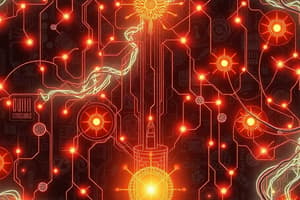Podcast
Questions and Answers
What is an ampere?
What is an ampere?
- A drawing of a circuit
- An electrical device
- A type of battery
- A unit of measure of the rate of current flow (correct)
What is a battery?
What is a battery?
A device that produces electricity
What is a circuit diagram?
What is a circuit diagram?
A drawing that traces the path that electron flow will take in an electronic circuit
A closed circuit allows current to flow.
A closed circuit allows current to flow.
What is a conductor?
What is a conductor?
Define electric circuit.
Define electric circuit.
What is electric current?
What is electric current?
What is an electrical symbol?
What is an electrical symbol?
Describe an insulator.
Describe an insulator.
What is a multimeter?
What is a multimeter?
What does Ohm's law state?
What does Ohm's law state?
An open circuit allows current to flow.
An open circuit allows current to flow.
What is electric resistance?
What is electric resistance?
What is a resistor?
What is a resistor?
Define a semiconductor.
Define a semiconductor.
What is the purpose of a switch?
What is the purpose of a switch?
What is voltage?
What is voltage?
Flashcards are hidden until you start studying
Study Notes
Fundamental Concepts of Electric Current
- Ampere: Unit measuring current flow; equals one coulomb per second.
- Battery: Generates electricity through chemical reactions.
- Electric Current: Continuous flow of electric charges in a conductor.
Electrical Components
- Circuit Diagram: Visual representation showing electron flow path in a circuit.
- Closed Circuit: Complete circuit allowing current to circulate; essential for functionality.
- Open Circuit: Incomplete circuit; current does not flow, rendering it nonfunctional.
Materials and Their Roles
- Conductor: Material used to transmit electricity or heat effectively.
- Insulator: Material that obstructs heat and electron flow; used to protect and separate conductive parts.
- Semiconductor: Material that can conduct electricity under certain conditions, crucial in electronic devices.
Circuit Elements
- Electric Circuit: A pathway allowing electricity to flow, consisting of various components.
- Switch: Device that opens or closes a circuit, facilitating control over current flow.
- Resistor: A component that impedes current flow, used for regulating voltages and currents.
Measurement and Laws
- Multimeter: Tool for measuring voltage, current, and resistance in circuits.
- Ohm's Law: Principle stating that current is directly proportional to voltage; crucial for circuit analysis.
- Voltage: Measurement of electric potential difference; determines the flow rate of electricity in a circuit.
Additional Concepts
- Electrical Symbol: Notation used to denote components in circuit diagrams, simplifying communication about circuits.
- Electric Resistance: Measure of opposition to current flow in a material, quantified in ohms.
Studying That Suits You
Use AI to generate personalized quizzes and flashcards to suit your learning preferences.




